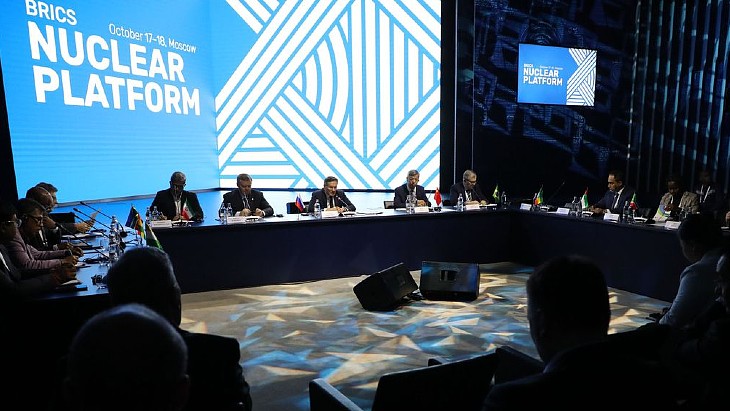The creation of the Nuclear Energy Platform is intended to share experience and support the development of nuclear technologies among BRICS+ member countries.

(Image: Rosatom)
The intergovernmental BRICS organisation's members are currently Brazil, Russia, India, China, South Africa, Iran, Egypt, Ethiopia and the UAE, with more than 20 other countries also expressing an interest in joining the organisation which is widely seen as a counterbalance to the G7 grouping of industrialised nations.
The presidency of what is now sometimes referred to as BRICS+ since its expansion from 5 to 10 members this year, is currently held by Russia, with its annual summit taking place in the city of Kazan next week. But ahead of that event, the BRICS+ Business Forum has been taking place, with the issue of collaboration in the field of peaceful uses of nuclear technology discussed at a meeting at Moscow Atom Museum.
Alexey Likhachev, Rosatom director general, said that nearly all the organisation's members were implementing projects in the field of nuclear energy: "Today, many BRICS members are the technological drivers of the international nuclear market. The common experience can and should be used and replicated throughout the BRICS space and on the planet as a whole. Therefore, we propose to join forces within the framework of the BRICS nuclear platform, a voluntary alliance of companies, professional nuclear communities and NGOs supporting the development and implementation of nuclear technologies."
BRICS member countries currently have 390 GWe of operable nuclear power units with a further 66 MWe under construction. One of the platform's aims is to help companies, if required, with persuading their governments to see nuclear as a clean energy source, and also share assistance for dealing with other issues which may be hampering nuclear energy projects.
According to Russia's official Tass news agency, Likhachev told reporters that the process of legal formalisation of the Nuclear Energy Platform had started and that its main aim was to develop and implement best practices relating to energy and non-energy use of nuclear technologies for peaceful purposes in BRICS and BRICS+ markets and to develop incentivising mechanisms and models of projects' implementation in member countries.
It reported him as saying that the platform was intended for companies, nuclear power plants and related organisations - "those capable of contributing to development of the nuclear power sector" - and the plan had been backed unanimously.
Orpet Peixoto, deputy chairman of the Brazilian Association for the Development of the Nuclear Industry, said: "I am very happy with the progress in the formation of the Platform. I believe that it will prove fruitful for BRICS countries and BRICS associate member-states ... we are one of the very few countries in the world with all the elements of nuclear fuel cycle but we need support, we need financing, and we know that we can get them through cooperation with the BRICS countries. So, I see Brazil has a lot to gain from the cooperation within the platform."
Meanwhile, speaking at the BRICS business forum on Friday, Russian President Vladimir Putin said that BRICS members now had a bigger share of global gross domestic product than the G7 members, saying its members were "in fact the drivers of global economic growth" and with the development of "communication channels, technological and educational standards, financial systems, payment instruments and, of course, mechanisms for sustainable, long-term investment ... the economic growth of BRICS members in the future will increasingly depend less on outside influence or interference".